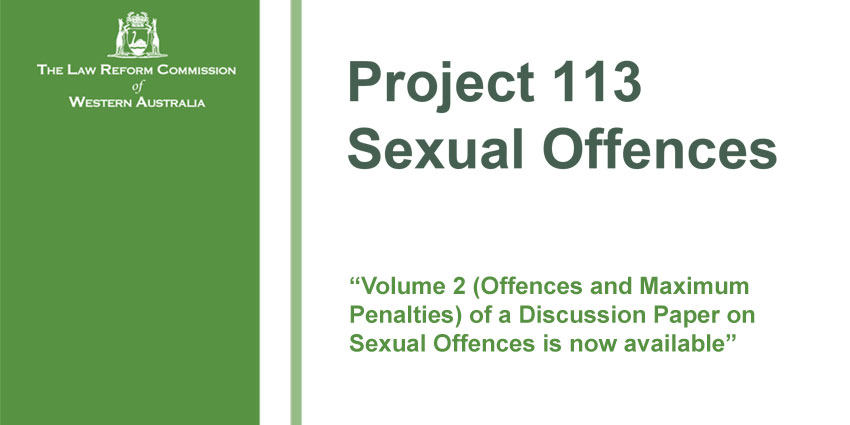
The Commission is currently examining issues including the definition of consent, the defence of mistaken belief in consent, the directions given to juries in sexual offence trials, our substantive sexual offences and their maximum penalties.
The Attorney General has now tabled in Parliament the Project 113 Sexual Offences - Final Report (PDF, 4.07MB)
Overview
The Commission has published the Discussion Paper in two parts.
Volume 1 of the Discussion Paper addresses the law of consent and the mistake of fact defence. It also considers issues relating to objectives and guiding principles, jury directions, special verdicts and the implementation and monitoring of reforms.
The Commission has also published short Issues Papers dealing with some of the individual topics discussed in Volume 1 of the Discussion Paper. They can be found at the bottom of this page and on the Project 113 - Sexual Offences publications page.
Volume 2 of the Discussion Paper focuses on the sexual offences that should be included in the Criminal Code the maximum penalties that should be set for those offences.
Discussion Papers
Background Paper
In order to assist stakeholders and members of the public to make submissions, the Commission engaged three legal academics, Professor Heather Douglas and Associate Professors Stella Tarrant and Hilde Tubex, to draft a Background Paper. The Background Paper discusses social issues relevant for considering sexual offence laws. It examines the issues from three perspectives: the harmfulness of sexual violence; common misconceptions about sexual violence; and complainants' experiences of the criminal justice system. The paper identifies relevant Western Australian data on sexual offending in each section. Additional Western Australian data is set out in an Appendix to the paper.
How do I make a submission?
The closing date for submissions was Sunday, 30 April 2023.
Individuals and organisations were invited to provide submission or complete an online survey on one or more of the options and questions in Volume 1 and Volume 2 of the Discussion Paper and Background Paper. The Commission also held consultations with reference groups, organisations or persons who wished to contribute to law reform in this area.
The Final Report will include a list of people and organisations that have made submissions. Please let the Commission know if you do not want to be included in that list. If you did not ask for your submission to be kept confidential, it will be treated as public. This means that it may be referred to in the Final Report.
Please contact the Commission at lrcwa@justice.wa.gov.au if you have any questions in relation to this reference.
Issues Papers
The Commission has prepared a series of short Issues Papers dealing with individual topics discussed in Volume 1 of the Discussion Paper. We hope that these will assist you to understand individual topics and access information in the Discussion Paper.
The Issues Papers are numbered consistently with the chapters in the Discussion Paper to which they relate. Each Issues Paper also has a title which indicates the topic discussed in that Issues Paper. Each Issues Paper tells you where in Volume 1 of the Discussion Paper you can find more information about that topic.
Submissions about your experience in the criminal justice system
The Office of the Commissioner for Victims of Crime is leading a review into the experiences of sexual violence victim-survivors in the criminal justice system. The review will consider the end-to-end process from reporting the offence to the release of an offender from custody.
If you would like to contribute to this review, you can find out more information on the Review of criminal justice responses to sexual offending page.
If we form the view that a submission that we receive would be relevant to the Office of the Commissioner for Victims of Crime’s review, we will forward it to the Office of the Commissioner for Victims of Crime. Please advise us if you do not want us to do so.


